Management Theory: Analyzing HRM, Leadership & Control for Success
VerifiedAdded on 2023/05/28
|12
|2640
|215
Essay
AI Summary
This essay explores the critical roles of Human Resource Management (HRM) practices, leadership styles, and organizational control and power in achieving organizational success. It discusses how efficient management enhances economic production and employee welfare. The essay evaluates the significance of control and power in facilitating coordination and communication within organizations, highlighting the importance of trust and the implementation of behavior, output, and input controls. It further examines the impact of strategic leadership in fostering resilience, strategic thinking, and knowledge development. The analysis includes real-world examples such as Asda's reward power and Aldi's strategic leadership. The essay also emphasizes the importance of HRM practices like talent acquisition, knowledge development, and incentive compensation, linking them to organizational productivity and financial results, as demonstrated by Lloyds Bank PLC. Finally, the essay concludes that strategic leaders with a clear vision and characterized business goals, coupled with effective control and inclusive management, enable modern organizations to thrive in competitive markets. Desklib provides this essay and other resources to aid students in their studies.
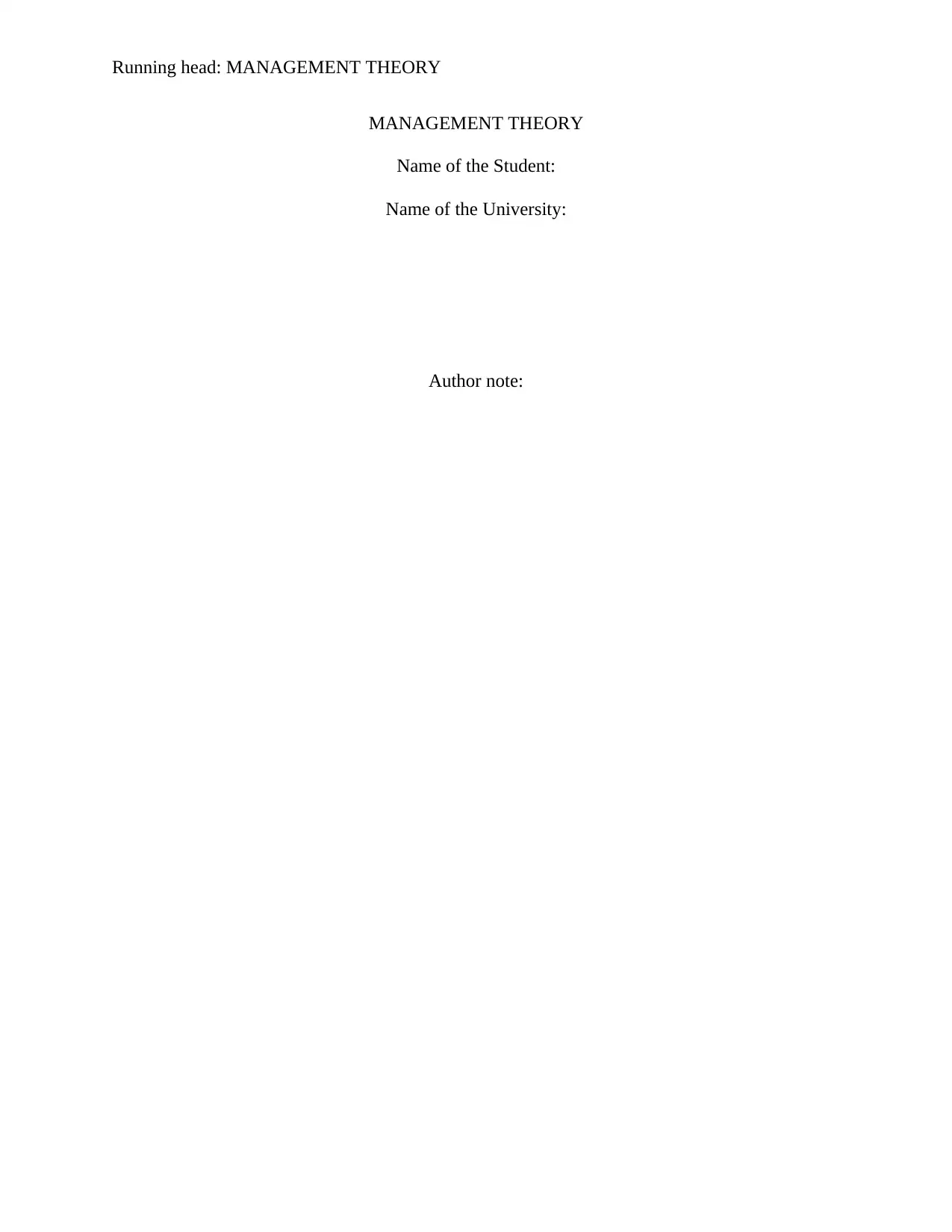
Running head: MANAGEMENT THEORY
MANAGEMENT THEORY
Name of the Student:
Name of the University:
Author note:
MANAGEMENT THEORY
Name of the Student:
Name of the University:
Author note:
Paraphrase This Document
Need a fresh take? Get an instant paraphrase of this document with our AI Paraphraser
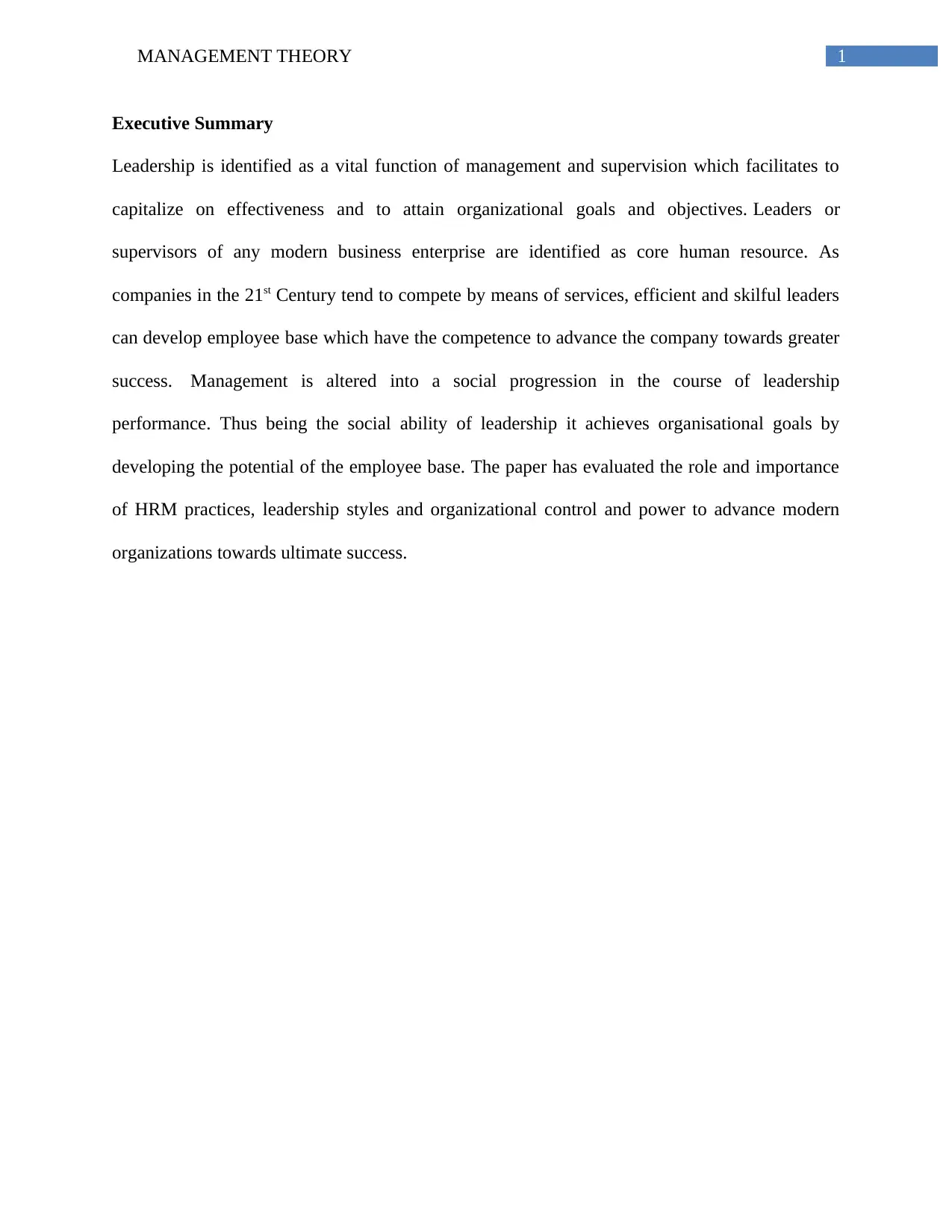
1MANAGEMENT THEORY
Executive Summary
Leadership is identified as a vital function of management and supervision which facilitates to
capitalize on effectiveness and to attain organizational goals and objectives. Leaders or
supervisors of any modern business enterprise are identified as core human resource. As
companies in the 21st Century tend to compete by means of services, efficient and skilful leaders
can develop employee base which have the competence to advance the company towards greater
success. Management is altered into a social progression in the course of leadership
performance. Thus being the social ability of leadership it achieves organisational goals by
developing the potential of the employee base. The paper has evaluated the role and importance
of HRM practices, leadership styles and organizational control and power to advance modern
organizations towards ultimate success.
Executive Summary
Leadership is identified as a vital function of management and supervision which facilitates to
capitalize on effectiveness and to attain organizational goals and objectives. Leaders or
supervisors of any modern business enterprise are identified as core human resource. As
companies in the 21st Century tend to compete by means of services, efficient and skilful leaders
can develop employee base which have the competence to advance the company towards greater
success. Management is altered into a social progression in the course of leadership
performance. Thus being the social ability of leadership it achieves organisational goals by
developing the potential of the employee base. The paper has evaluated the role and importance
of HRM practices, leadership styles and organizational control and power to advance modern
organizations towards ultimate success.
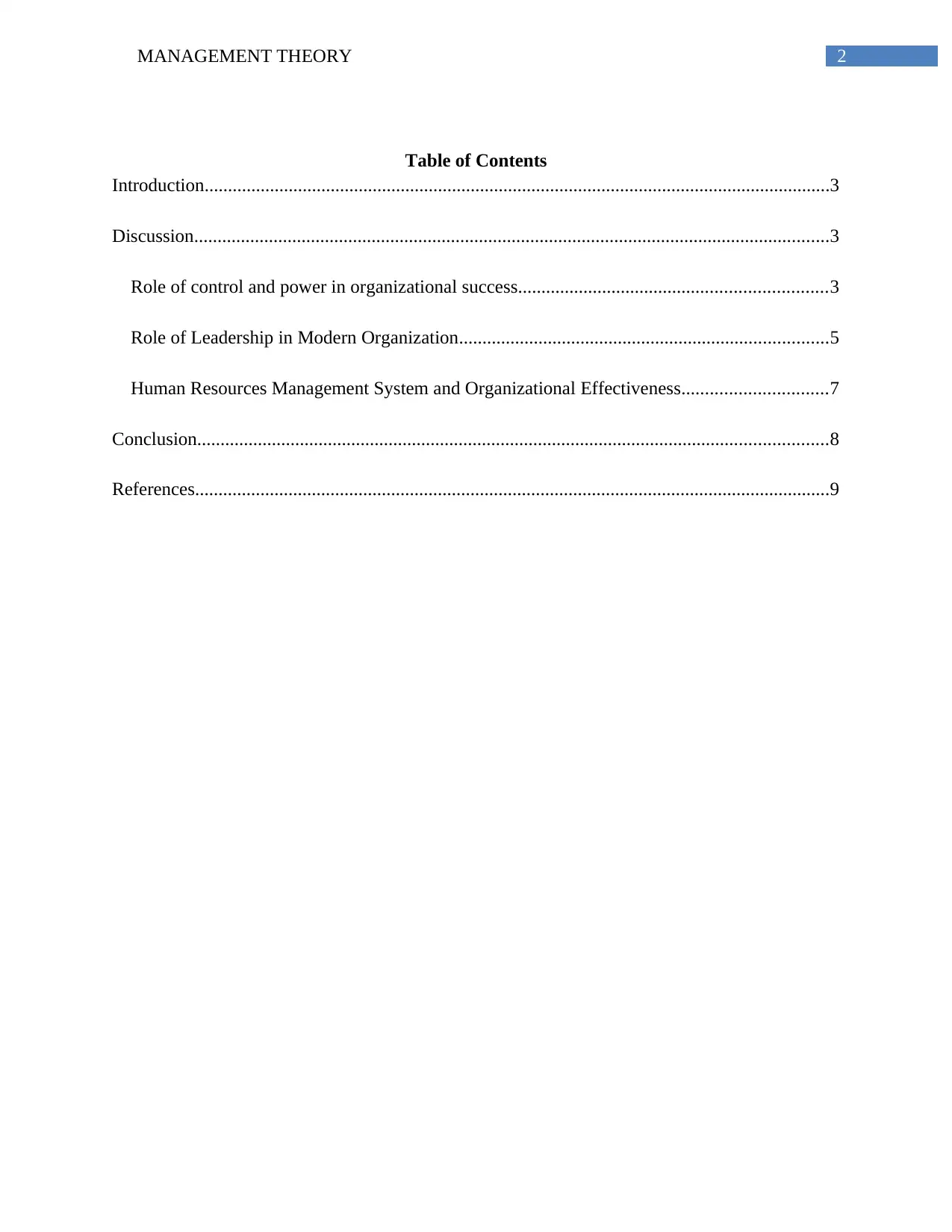
2MANAGEMENT THEORY
Table of Contents
Introduction......................................................................................................................................3
Discussion........................................................................................................................................3
Role of control and power in organizational success..................................................................3
Role of Leadership in Modern Organization...............................................................................5
Human Resources Management System and Organizational Effectiveness...............................7
Conclusion.......................................................................................................................................8
References........................................................................................................................................9
Table of Contents
Introduction......................................................................................................................................3
Discussion........................................................................................................................................3
Role of control and power in organizational success..................................................................3
Role of Leadership in Modern Organization...............................................................................5
Human Resources Management System and Organizational Effectiveness...............................7
Conclusion.......................................................................................................................................8
References........................................................................................................................................9
⊘ This is a preview!⊘
Do you want full access?
Subscribe today to unlock all pages.

Trusted by 1+ million students worldwide
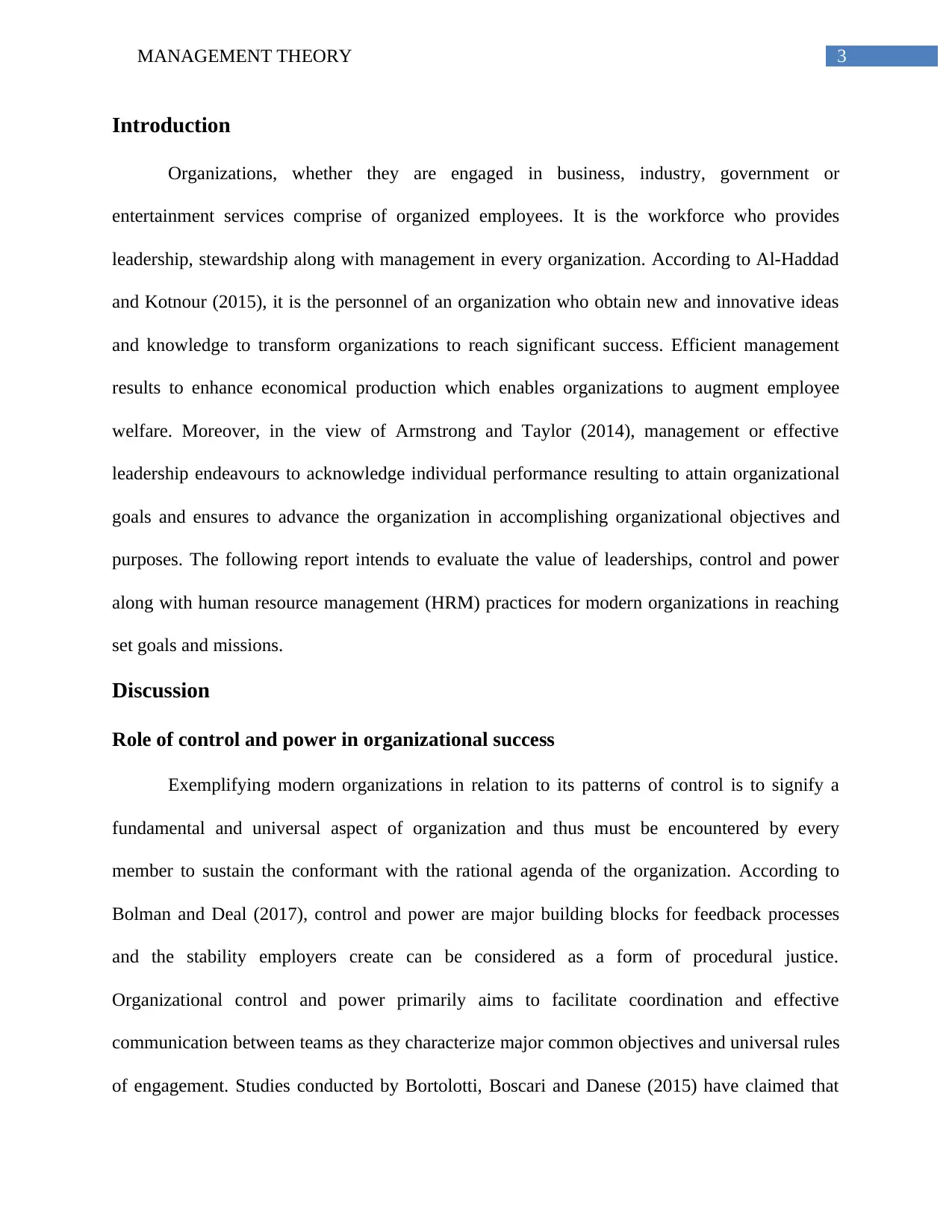
3MANAGEMENT THEORY
Introduction
Organizations, whether they are engaged in business, industry, government or
entertainment services comprise of organized employees. It is the workforce who provides
leadership, stewardship along with management in every organization. According to Al-Haddad
and Kotnour (2015), it is the personnel of an organization who obtain new and innovative ideas
and knowledge to transform organizations to reach significant success. Efficient management
results to enhance economical production which enables organizations to augment employee
welfare. Moreover, in the view of Armstrong and Taylor (2014), management or effective
leadership endeavours to acknowledge individual performance resulting to attain organizational
goals and ensures to advance the organization in accomplishing organizational objectives and
purposes. The following report intends to evaluate the value of leaderships, control and power
along with human resource management (HRM) practices for modern organizations in reaching
set goals and missions.
Discussion
Role of control and power in organizational success
Exemplifying modern organizations in relation to its patterns of control is to signify a
fundamental and universal aspect of organization and thus must be encountered by every
member to sustain the conformant with the rational agenda of the organization. According to
Bolman and Deal (2017), control and power are major building blocks for feedback processes
and the stability employers create can be considered as a form of procedural justice.
Organizational control and power primarily aims to facilitate coordination and effective
communication between teams as they characterize major common objectives and universal rules
of engagement. Studies conducted by Bortolotti, Boscari and Danese (2015) have claimed that
Introduction
Organizations, whether they are engaged in business, industry, government or
entertainment services comprise of organized employees. It is the workforce who provides
leadership, stewardship along with management in every organization. According to Al-Haddad
and Kotnour (2015), it is the personnel of an organization who obtain new and innovative ideas
and knowledge to transform organizations to reach significant success. Efficient management
results to enhance economical production which enables organizations to augment employee
welfare. Moreover, in the view of Armstrong and Taylor (2014), management or effective
leadership endeavours to acknowledge individual performance resulting to attain organizational
goals and ensures to advance the organization in accomplishing organizational objectives and
purposes. The following report intends to evaluate the value of leaderships, control and power
along with human resource management (HRM) practices for modern organizations in reaching
set goals and missions.
Discussion
Role of control and power in organizational success
Exemplifying modern organizations in relation to its patterns of control is to signify a
fundamental and universal aspect of organization and thus must be encountered by every
member to sustain the conformant with the rational agenda of the organization. According to
Bolman and Deal (2017), control and power are major building blocks for feedback processes
and the stability employers create can be considered as a form of procedural justice.
Organizational control and power primarily aims to facilitate coordination and effective
communication between teams as they characterize major common objectives and universal rules
of engagement. Studies conducted by Bortolotti, Boscari and Danese (2015) have claimed that
Paraphrase This Document
Need a fresh take? Get an instant paraphrase of this document with our AI Paraphraser
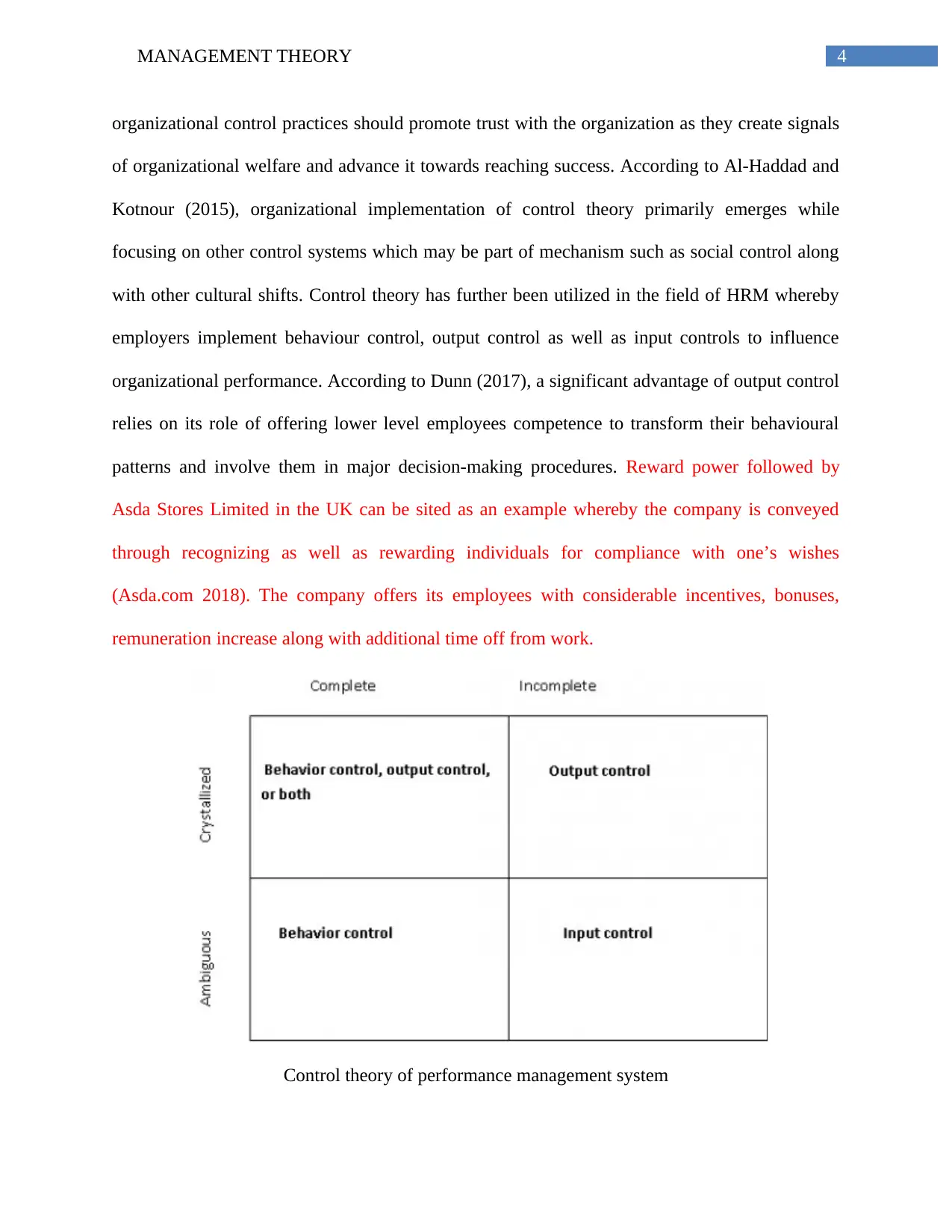
4MANAGEMENT THEORY
organizational control practices should promote trust with the organization as they create signals
of organizational welfare and advance it towards reaching success. According to Al-Haddad and
Kotnour (2015), organizational implementation of control theory primarily emerges while
focusing on other control systems which may be part of mechanism such as social control along
with other cultural shifts. Control theory has further been utilized in the field of HRM whereby
employers implement behaviour control, output control as well as input controls to influence
organizational performance. According to Dunn (2017), a significant advantage of output control
relies on its role of offering lower level employees competence to transform their behavioural
patterns and involve them in major decision-making procedures. Reward power followed by
Asda Stores Limited in the UK can be sited as an example whereby the company is conveyed
through recognizing as well as rewarding individuals for compliance with one’s wishes
(Asda.com 2018). The company offers its employees with considerable incentives, bonuses,
remuneration increase along with additional time off from work.
Control theory of performance management system
organizational control practices should promote trust with the organization as they create signals
of organizational welfare and advance it towards reaching success. According to Al-Haddad and
Kotnour (2015), organizational implementation of control theory primarily emerges while
focusing on other control systems which may be part of mechanism such as social control along
with other cultural shifts. Control theory has further been utilized in the field of HRM whereby
employers implement behaviour control, output control as well as input controls to influence
organizational performance. According to Dunn (2017), a significant advantage of output control
relies on its role of offering lower level employees competence to transform their behavioural
patterns and involve them in major decision-making procedures. Reward power followed by
Asda Stores Limited in the UK can be sited as an example whereby the company is conveyed
through recognizing as well as rewarding individuals for compliance with one’s wishes
(Asda.com 2018). The company offers its employees with considerable incentives, bonuses,
remuneration increase along with additional time off from work.
Control theory of performance management system
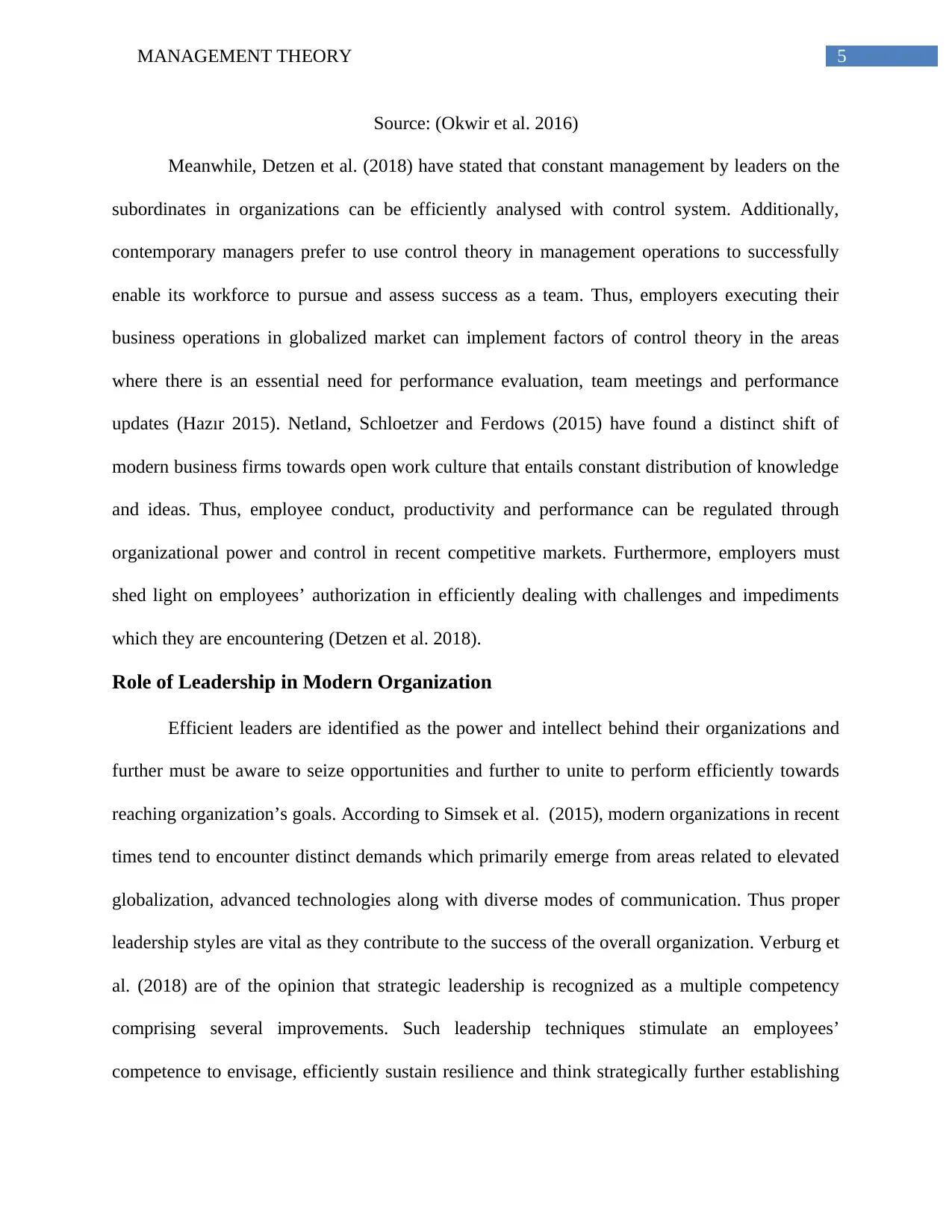
5MANAGEMENT THEORY
Source: (Okwir et al. 2016)
Meanwhile, Detzen et al. (2018) have stated that constant management by leaders on the
subordinates in organizations can be efficiently analysed with control system. Additionally,
contemporary managers prefer to use control theory in management operations to successfully
enable its workforce to pursue and assess success as a team. Thus, employers executing their
business operations in globalized market can implement factors of control theory in the areas
where there is an essential need for performance evaluation, team meetings and performance
updates (Hazır 2015). Netland, Schloetzer and Ferdows (2015) have found a distinct shift of
modern business firms towards open work culture that entails constant distribution of knowledge
and ideas. Thus, employee conduct, productivity and performance can be regulated through
organizational power and control in recent competitive markets. Furthermore, employers must
shed light on employees’ authorization in efficiently dealing with challenges and impediments
which they are encountering (Detzen et al. 2018).
Role of Leadership in Modern Organization
Efficient leaders are identified as the power and intellect behind their organizations and
further must be aware to seize opportunities and further to unite to perform efficiently towards
reaching organization’s goals. According to Simsek et al. (2015), modern organizations in recent
times tend to encounter distinct demands which primarily emerge from areas related to elevated
globalization, advanced technologies along with diverse modes of communication. Thus proper
leadership styles are vital as they contribute to the success of the overall organization. Verburg et
al. (2018) are of the opinion that strategic leadership is recognized as a multiple competency
comprising several improvements. Such leadership techniques stimulate an employees’
competence to envisage, efficiently sustain resilience and think strategically further establishing
Source: (Okwir et al. 2016)
Meanwhile, Detzen et al. (2018) have stated that constant management by leaders on the
subordinates in organizations can be efficiently analysed with control system. Additionally,
contemporary managers prefer to use control theory in management operations to successfully
enable its workforce to pursue and assess success as a team. Thus, employers executing their
business operations in globalized market can implement factors of control theory in the areas
where there is an essential need for performance evaluation, team meetings and performance
updates (Hazır 2015). Netland, Schloetzer and Ferdows (2015) have found a distinct shift of
modern business firms towards open work culture that entails constant distribution of knowledge
and ideas. Thus, employee conduct, productivity and performance can be regulated through
organizational power and control in recent competitive markets. Furthermore, employers must
shed light on employees’ authorization in efficiently dealing with challenges and impediments
which they are encountering (Detzen et al. 2018).
Role of Leadership in Modern Organization
Efficient leaders are identified as the power and intellect behind their organizations and
further must be aware to seize opportunities and further to unite to perform efficiently towards
reaching organization’s goals. According to Simsek et al. (2015), modern organizations in recent
times tend to encounter distinct demands which primarily emerge from areas related to elevated
globalization, advanced technologies along with diverse modes of communication. Thus proper
leadership styles are vital as they contribute to the success of the overall organization. Verburg et
al. (2018) are of the opinion that strategic leadership is recognized as a multiple competency
comprising several improvements. Such leadership techniques stimulate an employees’
competence to envisage, efficiently sustain resilience and think strategically further establishing
⊘ This is a preview!⊘
Do you want full access?
Subscribe today to unlock all pages.

Trusted by 1+ million students worldwide
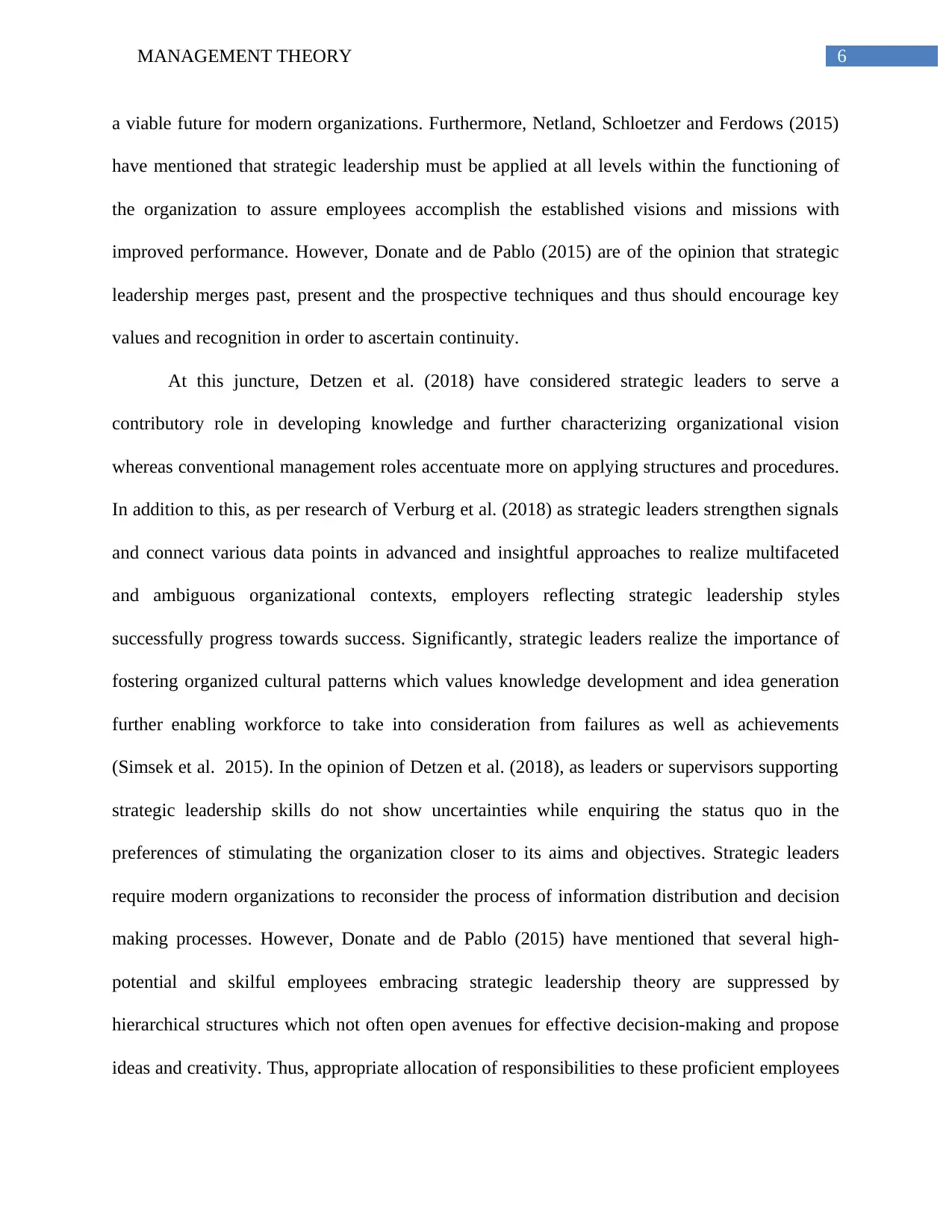
6MANAGEMENT THEORY
a viable future for modern organizations. Furthermore, Netland, Schloetzer and Ferdows (2015)
have mentioned that strategic leadership must be applied at all levels within the functioning of
the organization to assure employees accomplish the established visions and missions with
improved performance. However, Donate and de Pablo (2015) are of the opinion that strategic
leadership merges past, present and the prospective techniques and thus should encourage key
values and recognition in order to ascertain continuity.
At this juncture, Detzen et al. (2018) have considered strategic leaders to serve a
contributory role in developing knowledge and further characterizing organizational vision
whereas conventional management roles accentuate more on applying structures and procedures.
In addition to this, as per research of Verburg et al. (2018) as strategic leaders strengthen signals
and connect various data points in advanced and insightful approaches to realize multifaceted
and ambiguous organizational contexts, employers reflecting strategic leadership styles
successfully progress towards success. Significantly, strategic leaders realize the importance of
fostering organized cultural patterns which values knowledge development and idea generation
further enabling workforce to take into consideration from failures as well as achievements
(Simsek et al. 2015). In the opinion of Detzen et al. (2018), as leaders or supervisors supporting
strategic leadership skills do not show uncertainties while enquiring the status quo in the
preferences of stimulating the organization closer to its aims and objectives. Strategic leaders
require modern organizations to reconsider the process of information distribution and decision
making processes. However, Donate and de Pablo (2015) have mentioned that several high-
potential and skilful employees embracing strategic leadership theory are suppressed by
hierarchical structures which not often open avenues for effective decision-making and propose
ideas and creativity. Thus, appropriate allocation of responsibilities to these proficient employees
a viable future for modern organizations. Furthermore, Netland, Schloetzer and Ferdows (2015)
have mentioned that strategic leadership must be applied at all levels within the functioning of
the organization to assure employees accomplish the established visions and missions with
improved performance. However, Donate and de Pablo (2015) are of the opinion that strategic
leadership merges past, present and the prospective techniques and thus should encourage key
values and recognition in order to ascertain continuity.
At this juncture, Detzen et al. (2018) have considered strategic leaders to serve a
contributory role in developing knowledge and further characterizing organizational vision
whereas conventional management roles accentuate more on applying structures and procedures.
In addition to this, as per research of Verburg et al. (2018) as strategic leaders strengthen signals
and connect various data points in advanced and insightful approaches to realize multifaceted
and ambiguous organizational contexts, employers reflecting strategic leadership styles
successfully progress towards success. Significantly, strategic leaders realize the importance of
fostering organized cultural patterns which values knowledge development and idea generation
further enabling workforce to take into consideration from failures as well as achievements
(Simsek et al. 2015). In the opinion of Detzen et al. (2018), as leaders or supervisors supporting
strategic leadership skills do not show uncertainties while enquiring the status quo in the
preferences of stimulating the organization closer to its aims and objectives. Strategic leaders
require modern organizations to reconsider the process of information distribution and decision
making processes. However, Donate and de Pablo (2015) have mentioned that several high-
potential and skilful employees embracing strategic leadership theory are suppressed by
hierarchical structures which not often open avenues for effective decision-making and propose
ideas and creativity. Thus, appropriate allocation of responsibilities to these proficient employees
Paraphrase This Document
Need a fresh take? Get an instant paraphrase of this document with our AI Paraphraser
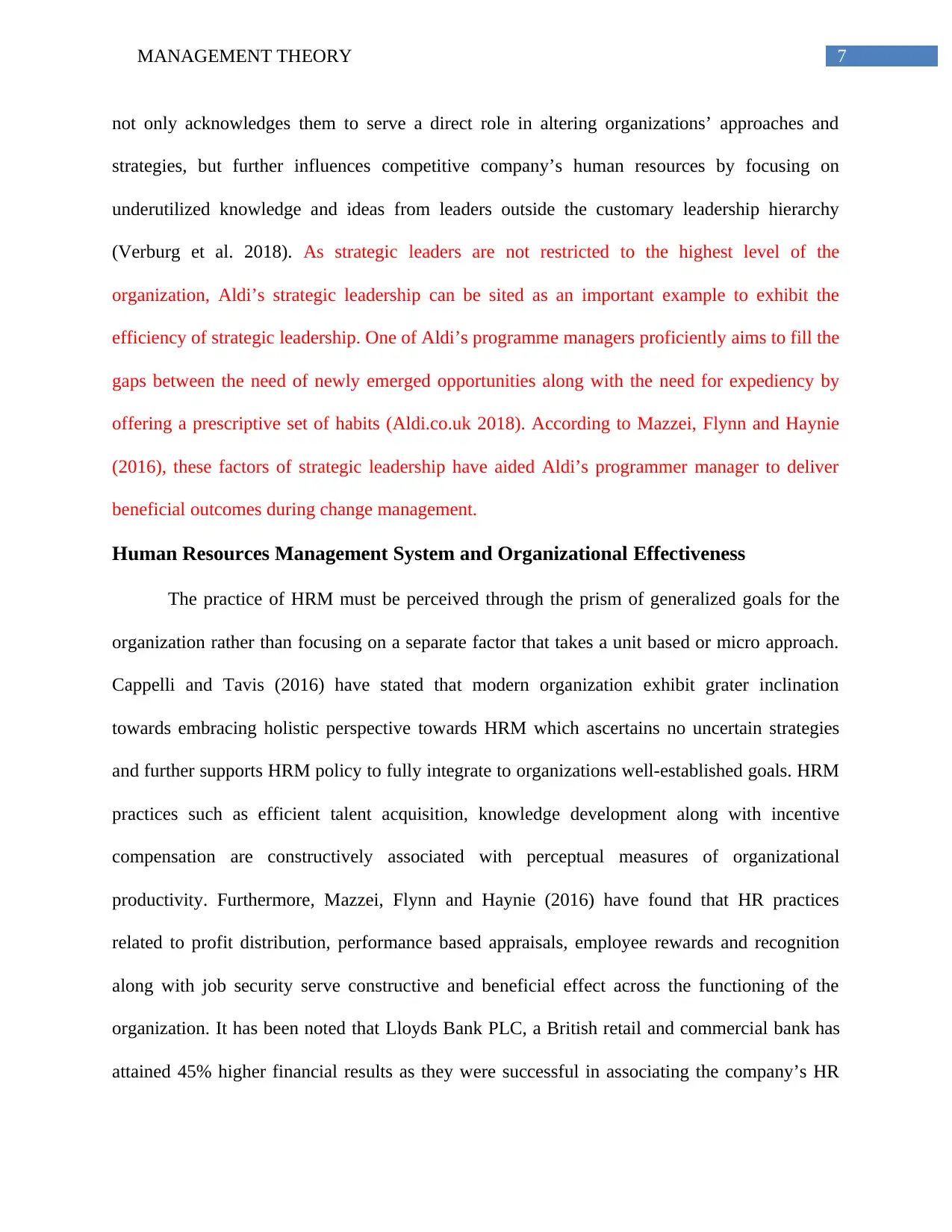
7MANAGEMENT THEORY
not only acknowledges them to serve a direct role in altering organizations’ approaches and
strategies, but further influences competitive company’s human resources by focusing on
underutilized knowledge and ideas from leaders outside the customary leadership hierarchy
(Verburg et al. 2018). As strategic leaders are not restricted to the highest level of the
organization, Aldi’s strategic leadership can be sited as an important example to exhibit the
efficiency of strategic leadership. One of Aldi’s programme managers proficiently aims to fill the
gaps between the need of newly emerged opportunities along with the need for expediency by
offering a prescriptive set of habits (Aldi.co.uk 2018). According to Mazzei, Flynn and Haynie
(2016), these factors of strategic leadership have aided Aldi’s programmer manager to deliver
beneficial outcomes during change management.
Human Resources Management System and Organizational Effectiveness
The practice of HRM must be perceived through the prism of generalized goals for the
organization rather than focusing on a separate factor that takes a unit based or micro approach.
Cappelli and Tavis (2016) have stated that modern organization exhibit grater inclination
towards embracing holistic perspective towards HRM which ascertains no uncertain strategies
and further supports HRM policy to fully integrate to organizations well-established goals. HRM
practices such as efficient talent acquisition, knowledge development along with incentive
compensation are constructively associated with perceptual measures of organizational
productivity. Furthermore, Mazzei, Flynn and Haynie (2016) have found that HR practices
related to profit distribution, performance based appraisals, employee rewards and recognition
along with job security serve constructive and beneficial effect across the functioning of the
organization. It has been noted that Lloyds Bank PLC, a British retail and commercial bank has
attained 45% higher financial results as they were successful in associating the company’s HR
not only acknowledges them to serve a direct role in altering organizations’ approaches and
strategies, but further influences competitive company’s human resources by focusing on
underutilized knowledge and ideas from leaders outside the customary leadership hierarchy
(Verburg et al. 2018). As strategic leaders are not restricted to the highest level of the
organization, Aldi’s strategic leadership can be sited as an important example to exhibit the
efficiency of strategic leadership. One of Aldi’s programme managers proficiently aims to fill the
gaps between the need of newly emerged opportunities along with the need for expediency by
offering a prescriptive set of habits (Aldi.co.uk 2018). According to Mazzei, Flynn and Haynie
(2016), these factors of strategic leadership have aided Aldi’s programmer manager to deliver
beneficial outcomes during change management.
Human Resources Management System and Organizational Effectiveness
The practice of HRM must be perceived through the prism of generalized goals for the
organization rather than focusing on a separate factor that takes a unit based or micro approach.
Cappelli and Tavis (2016) have stated that modern organization exhibit grater inclination
towards embracing holistic perspective towards HRM which ascertains no uncertain strategies
and further supports HRM policy to fully integrate to organizations well-established goals. HRM
practices such as efficient talent acquisition, knowledge development along with incentive
compensation are constructively associated with perceptual measures of organizational
productivity. Furthermore, Mazzei, Flynn and Haynie (2016) have found that HR practices
related to profit distribution, performance based appraisals, employee rewards and recognition
along with job security serve constructive and beneficial effect across the functioning of the
organization. It has been noted that Lloyds Bank PLC, a British retail and commercial bank has
attained 45% higher financial results as they were successful in associating the company’s HR
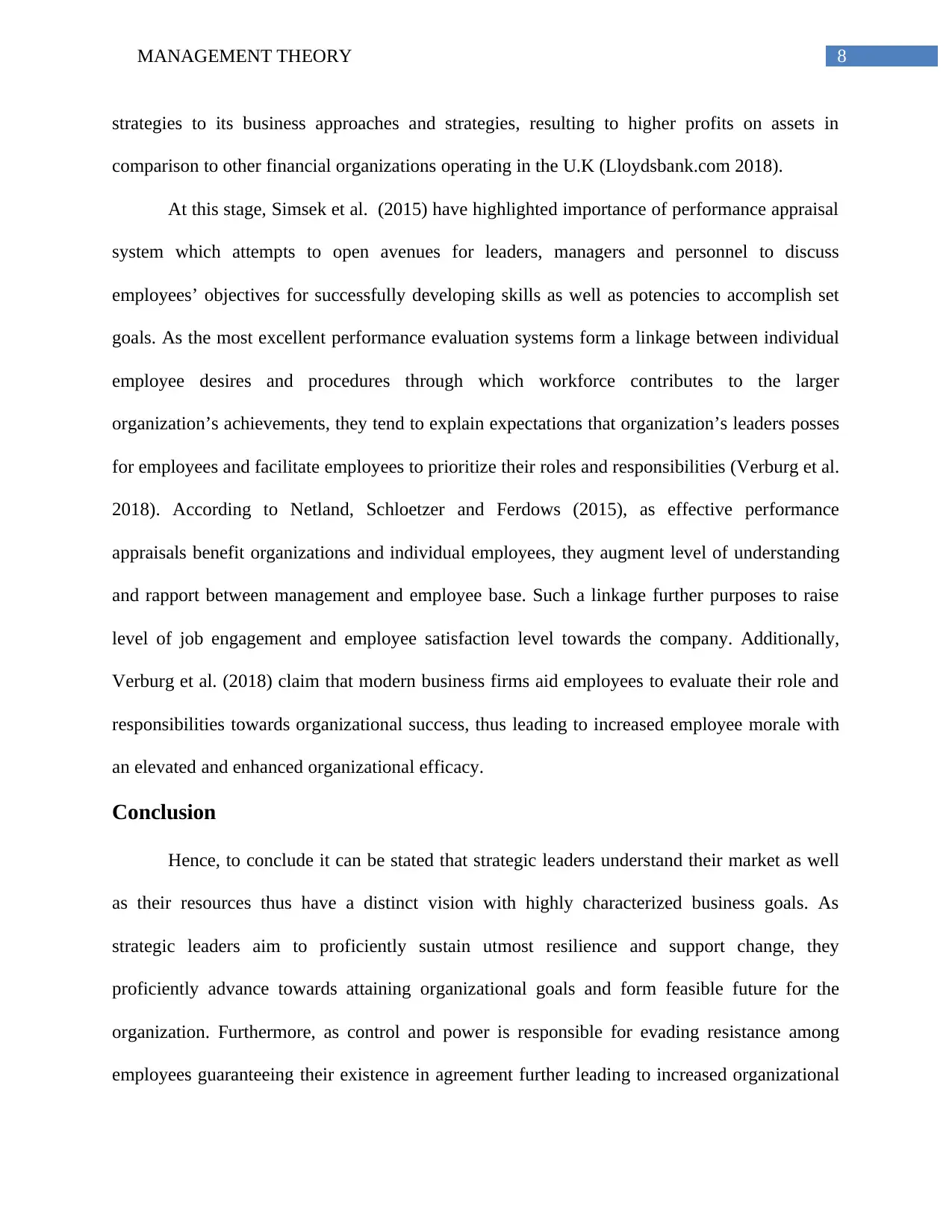
8MANAGEMENT THEORY
strategies to its business approaches and strategies, resulting to higher profits on assets in
comparison to other financial organizations operating in the U.K (Lloydsbank.com 2018).
At this stage, Simsek et al. (2015) have highlighted importance of performance appraisal
system which attempts to open avenues for leaders, managers and personnel to discuss
employees’ objectives for successfully developing skills as well as potencies to accomplish set
goals. As the most excellent performance evaluation systems form a linkage between individual
employee desires and procedures through which workforce contributes to the larger
organization’s achievements, they tend to explain expectations that organization’s leaders posses
for employees and facilitate employees to prioritize their roles and responsibilities (Verburg et al.
2018). According to Netland, Schloetzer and Ferdows (2015), as effective performance
appraisals benefit organizations and individual employees, they augment level of understanding
and rapport between management and employee base. Such a linkage further purposes to raise
level of job engagement and employee satisfaction level towards the company. Additionally,
Verburg et al. (2018) claim that modern business firms aid employees to evaluate their role and
responsibilities towards organizational success, thus leading to increased employee morale with
an elevated and enhanced organizational efficacy.
Conclusion
Hence, to conclude it can be stated that strategic leaders understand their market as well
as their resources thus have a distinct vision with highly characterized business goals. As
strategic leaders aim to proficiently sustain utmost resilience and support change, they
proficiently advance towards attaining organizational goals and form feasible future for the
organization. Furthermore, as control and power is responsible for evading resistance among
employees guaranteeing their existence in agreement further leading to increased organizational
strategies to its business approaches and strategies, resulting to higher profits on assets in
comparison to other financial organizations operating in the U.K (Lloydsbank.com 2018).
At this stage, Simsek et al. (2015) have highlighted importance of performance appraisal
system which attempts to open avenues for leaders, managers and personnel to discuss
employees’ objectives for successfully developing skills as well as potencies to accomplish set
goals. As the most excellent performance evaluation systems form a linkage between individual
employee desires and procedures through which workforce contributes to the larger
organization’s achievements, they tend to explain expectations that organization’s leaders posses
for employees and facilitate employees to prioritize their roles and responsibilities (Verburg et al.
2018). According to Netland, Schloetzer and Ferdows (2015), as effective performance
appraisals benefit organizations and individual employees, they augment level of understanding
and rapport between management and employee base. Such a linkage further purposes to raise
level of job engagement and employee satisfaction level towards the company. Additionally,
Verburg et al. (2018) claim that modern business firms aid employees to evaluate their role and
responsibilities towards organizational success, thus leading to increased employee morale with
an elevated and enhanced organizational efficacy.
Conclusion
Hence, to conclude it can be stated that strategic leaders understand their market as well
as their resources thus have a distinct vision with highly characterized business goals. As
strategic leaders aim to proficiently sustain utmost resilience and support change, they
proficiently advance towards attaining organizational goals and form feasible future for the
organization. Furthermore, as control and power is responsible for evading resistance among
employees guaranteeing their existence in agreement further leading to increased organizational
⊘ This is a preview!⊘
Do you want full access?
Subscribe today to unlock all pages.

Trusted by 1+ million students worldwide
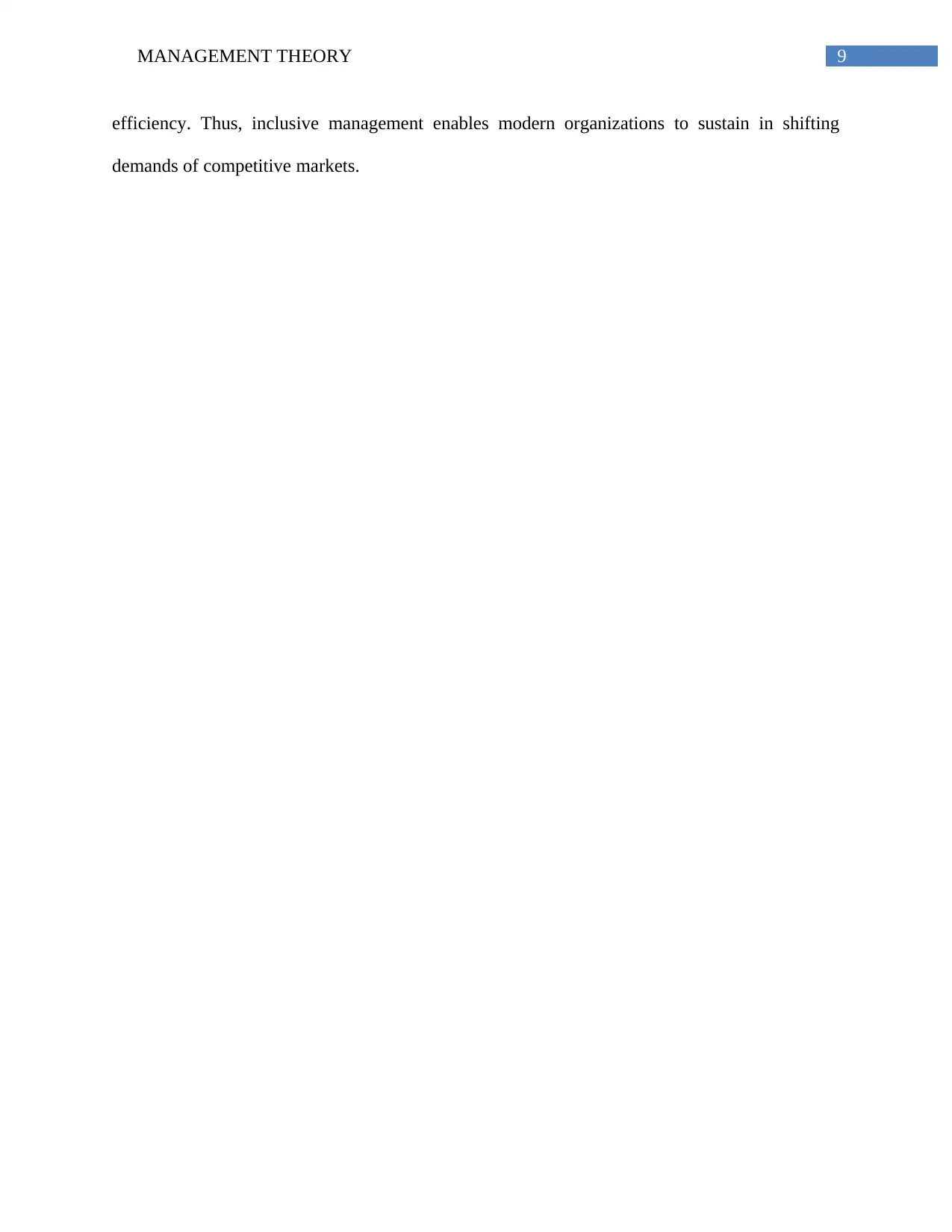
9MANAGEMENT THEORY
efficiency. Thus, inclusive management enables modern organizations to sustain in shifting
demands of competitive markets.
efficiency. Thus, inclusive management enables modern organizations to sustain in shifting
demands of competitive markets.
Paraphrase This Document
Need a fresh take? Get an instant paraphrase of this document with our AI Paraphraser
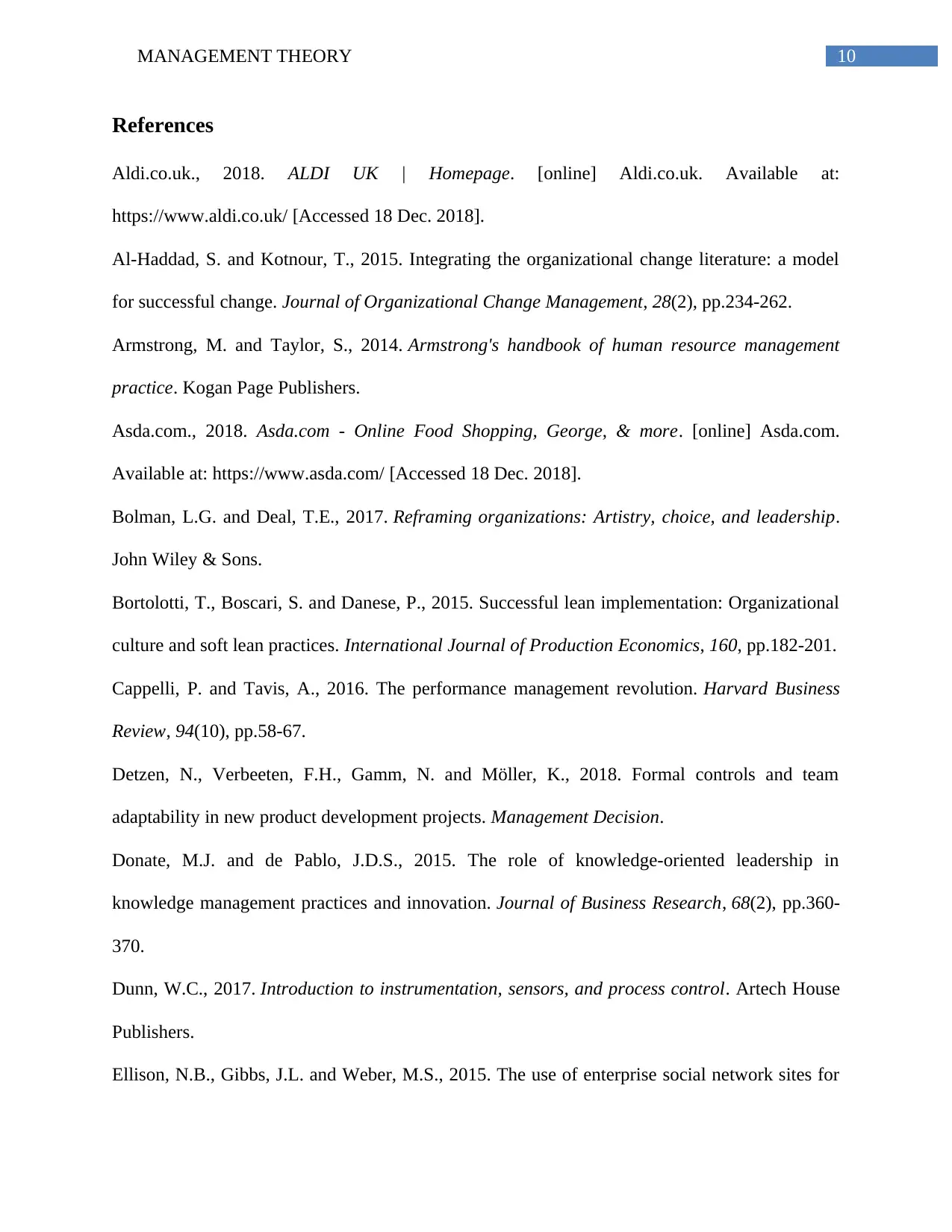
10MANAGEMENT THEORY
References
Aldi.co.uk., 2018. ALDI UK | Homepage. [online] Aldi.co.uk. Available at:
https://www.aldi.co.uk/ [Accessed 18 Dec. 2018].
Al-Haddad, S. and Kotnour, T., 2015. Integrating the organizational change literature: a model
for successful change. Journal of Organizational Change Management, 28(2), pp.234-262.
Armstrong, M. and Taylor, S., 2014. Armstrong's handbook of human resource management
practice. Kogan Page Publishers.
Asda.com., 2018. Asda.com - Online Food Shopping, George, & more. [online] Asda.com.
Available at: https://www.asda.com/ [Accessed 18 Dec. 2018].
Bolman, L.G. and Deal, T.E., 2017. Reframing organizations: Artistry, choice, and leadership.
John Wiley & Sons.
Bortolotti, T., Boscari, S. and Danese, P., 2015. Successful lean implementation: Organizational
culture and soft lean practices. International Journal of Production Economics, 160, pp.182-201.
Cappelli, P. and Tavis, A., 2016. The performance management revolution. Harvard Business
Review, 94(10), pp.58-67.
Detzen, N., Verbeeten, F.H., Gamm, N. and Möller, K., 2018. Formal controls and team
adaptability in new product development projects. Management Decision.
Donate, M.J. and de Pablo, J.D.S., 2015. The role of knowledge-oriented leadership in
knowledge management practices and innovation. Journal of Business Research, 68(2), pp.360-
370.
Dunn, W.C., 2017. Introduction to instrumentation, sensors, and process control. Artech House
Publishers.
Ellison, N.B., Gibbs, J.L. and Weber, M.S., 2015. The use of enterprise social network sites for
References
Aldi.co.uk., 2018. ALDI UK | Homepage. [online] Aldi.co.uk. Available at:
https://www.aldi.co.uk/ [Accessed 18 Dec. 2018].
Al-Haddad, S. and Kotnour, T., 2015. Integrating the organizational change literature: a model
for successful change. Journal of Organizational Change Management, 28(2), pp.234-262.
Armstrong, M. and Taylor, S., 2014. Armstrong's handbook of human resource management
practice. Kogan Page Publishers.
Asda.com., 2018. Asda.com - Online Food Shopping, George, & more. [online] Asda.com.
Available at: https://www.asda.com/ [Accessed 18 Dec. 2018].
Bolman, L.G. and Deal, T.E., 2017. Reframing organizations: Artistry, choice, and leadership.
John Wiley & Sons.
Bortolotti, T., Boscari, S. and Danese, P., 2015. Successful lean implementation: Organizational
culture and soft lean practices. International Journal of Production Economics, 160, pp.182-201.
Cappelli, P. and Tavis, A., 2016. The performance management revolution. Harvard Business
Review, 94(10), pp.58-67.
Detzen, N., Verbeeten, F.H., Gamm, N. and Möller, K., 2018. Formal controls and team
adaptability in new product development projects. Management Decision.
Donate, M.J. and de Pablo, J.D.S., 2015. The role of knowledge-oriented leadership in
knowledge management practices and innovation. Journal of Business Research, 68(2), pp.360-
370.
Dunn, W.C., 2017. Introduction to instrumentation, sensors, and process control. Artech House
Publishers.
Ellison, N.B., Gibbs, J.L. and Weber, M.S., 2015. The use of enterprise social network sites for
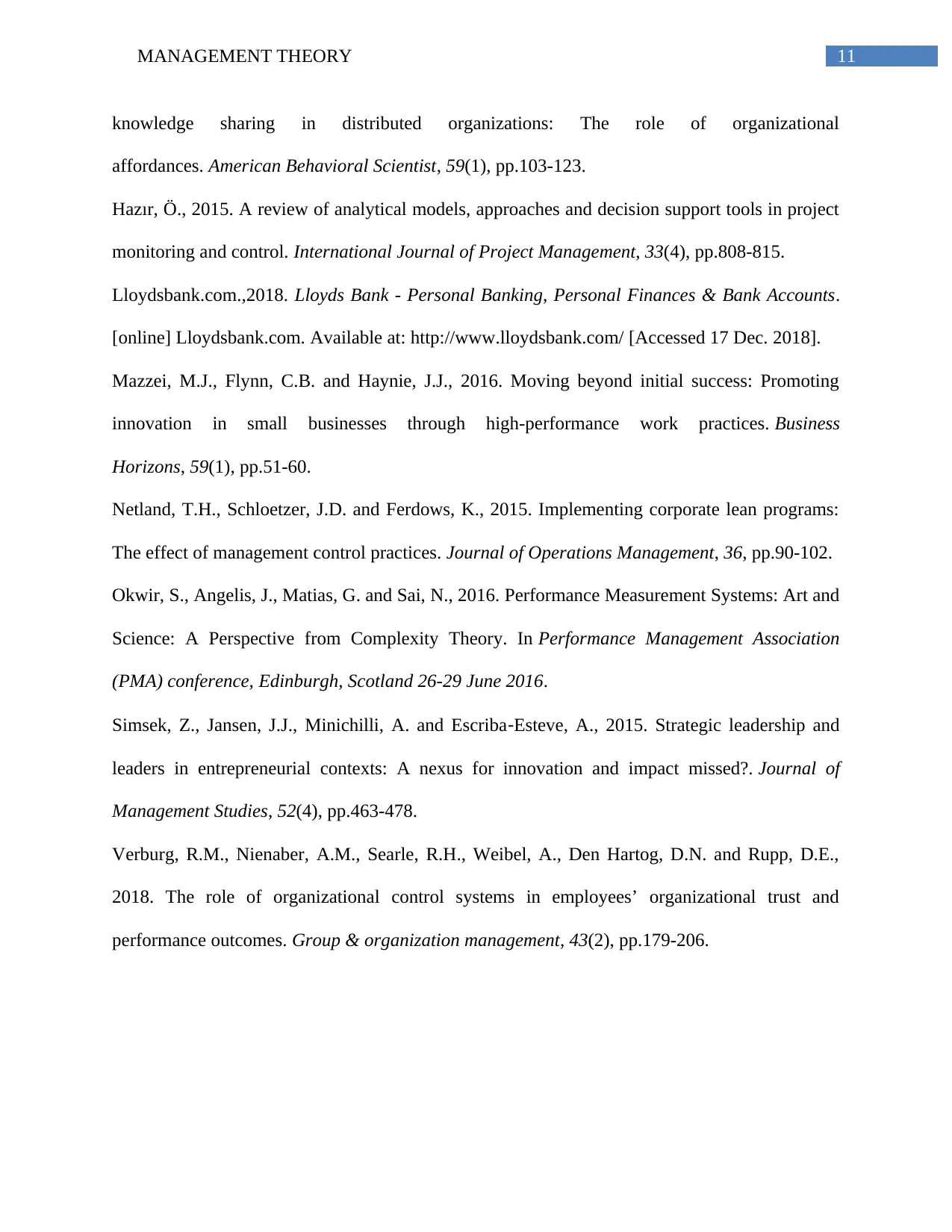
11MANAGEMENT THEORY
knowledge sharing in distributed organizations: The role of organizational
affordances. American Behavioral Scientist, 59(1), pp.103-123.
Hazır, Ö., 2015. A review of analytical models, approaches and decision support tools in project
monitoring and control. International Journal of Project Management, 33(4), pp.808-815.
Lloydsbank.com.,2018. Lloyds Bank - Personal Banking, Personal Finances & Bank Accounts.
[online] Lloydsbank.com. Available at: http://www.lloydsbank.com/ [Accessed 17 Dec. 2018].
Mazzei, M.J., Flynn, C.B. and Haynie, J.J., 2016. Moving beyond initial success: Promoting
innovation in small businesses through high-performance work practices. Business
Horizons, 59(1), pp.51-60.
Netland, T.H., Schloetzer, J.D. and Ferdows, K., 2015. Implementing corporate lean programs:
The effect of management control practices. Journal of Operations Management, 36, pp.90-102.
Okwir, S., Angelis, J., Matias, G. and Sai, N., 2016. Performance Measurement Systems: Art and
Science: A Perspective from Complexity Theory. In Performance Management Association
(PMA) conference, Edinburgh, Scotland 26-29 June 2016.
Simsek, Z., Jansen, J.J., Minichilli, A. and Escriba‐Esteve, A., 2015. Strategic leadership and
leaders in entrepreneurial contexts: A nexus for innovation and impact missed?. Journal of
Management Studies, 52(4), pp.463-478.
Verburg, R.M., Nienaber, A.M., Searle, R.H., Weibel, A., Den Hartog, D.N. and Rupp, D.E.,
2018. The role of organizational control systems in employees’ organizational trust and
performance outcomes. Group & organization management, 43(2), pp.179-206.
knowledge sharing in distributed organizations: The role of organizational
affordances. American Behavioral Scientist, 59(1), pp.103-123.
Hazır, Ö., 2015. A review of analytical models, approaches and decision support tools in project
monitoring and control. International Journal of Project Management, 33(4), pp.808-815.
Lloydsbank.com.,2018. Lloyds Bank - Personal Banking, Personal Finances & Bank Accounts.
[online] Lloydsbank.com. Available at: http://www.lloydsbank.com/ [Accessed 17 Dec. 2018].
Mazzei, M.J., Flynn, C.B. and Haynie, J.J., 2016. Moving beyond initial success: Promoting
innovation in small businesses through high-performance work practices. Business
Horizons, 59(1), pp.51-60.
Netland, T.H., Schloetzer, J.D. and Ferdows, K., 2015. Implementing corporate lean programs:
The effect of management control practices. Journal of Operations Management, 36, pp.90-102.
Okwir, S., Angelis, J., Matias, G. and Sai, N., 2016. Performance Measurement Systems: Art and
Science: A Perspective from Complexity Theory. In Performance Management Association
(PMA) conference, Edinburgh, Scotland 26-29 June 2016.
Simsek, Z., Jansen, J.J., Minichilli, A. and Escriba‐Esteve, A., 2015. Strategic leadership and
leaders in entrepreneurial contexts: A nexus for innovation and impact missed?. Journal of
Management Studies, 52(4), pp.463-478.
Verburg, R.M., Nienaber, A.M., Searle, R.H., Weibel, A., Den Hartog, D.N. and Rupp, D.E.,
2018. The role of organizational control systems in employees’ organizational trust and
performance outcomes. Group & organization management, 43(2), pp.179-206.
⊘ This is a preview!⊘
Do you want full access?
Subscribe today to unlock all pages.

Trusted by 1+ million students worldwide
1 out of 12
Related Documents
Your All-in-One AI-Powered Toolkit for Academic Success.
+13062052269
info@desklib.com
Available 24*7 on WhatsApp / Email
![[object Object]](/_next/static/media/star-bottom.7253800d.svg)
Unlock your academic potential
Copyright © 2020–2026 A2Z Services. All Rights Reserved. Developed and managed by ZUCOL.





